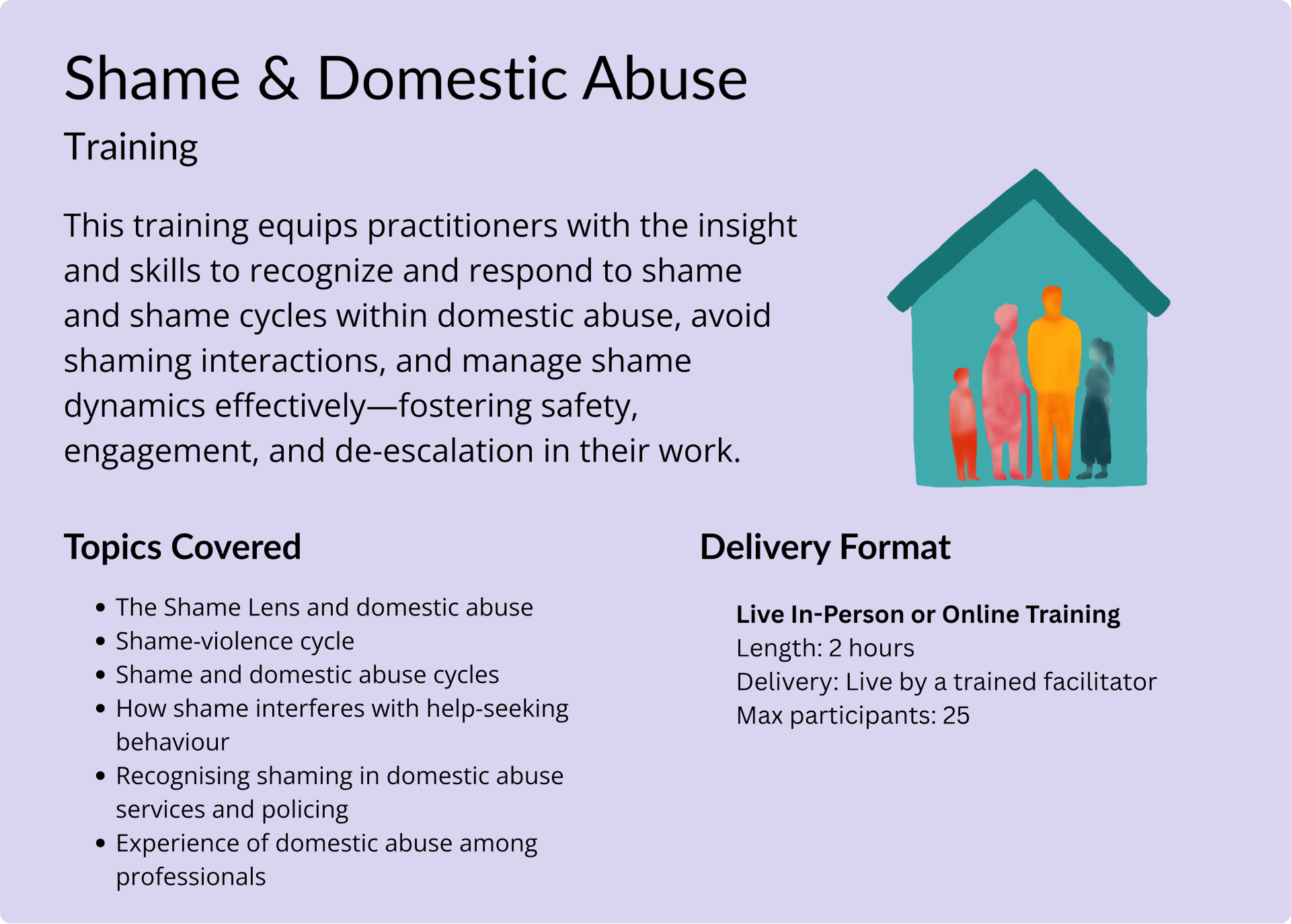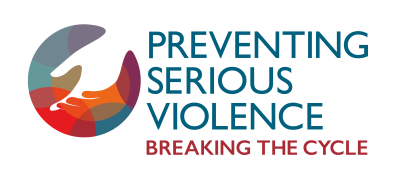

Training Overview
Prerequisites
- 2-hour online Introduction to Shame Competence training
- 1-day Shame Competence Training for Police and Violence Reduction
- 1-day Shame Competence for Trauma Informed Practitioners
Testimonials
“I recognise shame feelings in myself in others more easily thanks to the 'shame lens.'”
“It was all helpful and thought provoking.”
Trusted by:






Shame Engagement in Medical Learners
Our ongoing analysis has thus far revealed that:
- shame often centers on--and is sustained by--entrenched assumptions about oneself, especially in relation to others, operating as facts.
- constructive engagement with shame involves challenging these assumptions and considering alternate possibilities.
- shame recovery often includes a transition from an internalized, distressed state to an externalized, other-oriented state.
- constructive shame engagement entails efforts to stabilize self-concept, the success of which is afforded by underlying emotional "scaffolding." We are still in the process of more fully understanding what comprises this scaffolding.
Measuring shame exposure in medical learners
We are planning follow on studies to explore the prevalence and epidemiology of shame in medical learners and healthcare professionals. This will include exploring relationships among shame and factors such as gender, race/ethnicity, specialty, etc. These data will provide different, meaningful insights than those afforded by our qualitative research program.
Will is an Associate Professor of Family Medicine and and a veteran of the United States Air Force. He received his M.D. at the University of South Carolina School of Medicine in 2010 and Ph.D. in Health Professions Education at Maastricht University in the Netherlands in 2023, where defended his thesis entitled “Out of the shadows: a qualitative exploration of shame in medical learners.”
Along with Luna, he is a co-creator of The Shame Space, a global consortium that advances open communication about the role of shame in healthcare, a co-producer on the award winning “Shame in Medicine” podcast series produced by The Nocturnists, and a co-founder of The Shame Lab, which catalyzes research and training to advance shame competence in healthcare and beyond. He is the author of over 30 peer-reviewed publications and has given over 150 workshops and presentations to top hospitals, conferences, and organizations such as Massachusetts General Hospital, Children’s Hospital of Pennsylvania, and the American Hospital Association. He has received numerous awards for his research including Best Paper by the AAMC Research in Medical Education Committee in 2021 and Best Doctoral Report by the Association of Medical Educators of Europe in 2023.
Luna is Professor of Philosophy and Medical Humanities at the University of Exeter, based at the Centre for Cultures and Environments of Health. She has been researching shame for over 15 years and is PI of the Shame and Medicine Project (2020-2025), funded by the Wellcome Trust, and was PI of the Scenes of Shame and Stigma in COVID-19 Project (2020-2022), funded by the UKRI Arts and Humanities Research Council. Luna is author of The Body and Shame: Phenomenology, Feminism and the Socially Shaped Body (Lexington Books, 2015), and co-author of Covid-19 and Shame: Political Emotions and Public Health in the UK (Bloomsbury, 2023), co-authored with Fred Cooper and Arthur Rose. She worked with Matthew Gibson to develop principles for Shame-Sensitive Practice. Subsequently, Luna developed training in ‘shame competence’ in collaboration with the Devon & Cornwall Police. She has also worked closely with the Plymouth Trauma Informed Network to embed shame competence into trauma-informed approaches to practice. See Luna’s University of Exeter Staff Profile here.
James is a member of the Enterprise & Innovations Programmes Team, working on commercialisation and consultancy for the Humanities, Arts and Social Sciences. James supports academics in understanding and developing the best pathway to ensure greater impact from research. This could be seeing if any potential licences, spinouts or consultancy projects would be the best routes. James also works on the ESRC/AHRC SHAPE Catalyst, which supports the commercialisation of research across all UK Universities and SHAPE academics.
Vivienne is the Project Administrator and works one day a week to support the team. She has been working at the University of Exeter since January 2013, on a number of research projects.
Vivienne has been a contact point for people wishing to attend the Shame Competence for Trauma-Informed Practitioners Training based in Plymouth. She has been sending the delegates the information needed to attend and is contacting them with the evaluation surveys at each suitable point. This will help us to gather as much data as possible and ensure the final survey is sent two months after the training for each delegate. She is also supporting the trainers with regard to the venue and resources.
Anna is a fourth year medical student at the Duke University School of Medicine. During her time in medical school, she has co-led her medical school’s Wellness Committee and created a podcast entitled “A Flutter” to better understand how stigmatized emotions and life circumstances affect medical learners’ educational experiences. Alongside Will and Luna, she has participated in research that explores medical learner engagement with shame and identifies factors influencing this engagement. She has presented this work at professional meetings, including the AAMC Annual Meeting. Anna plans to pursue a career in pediatrics after medical school.
Sophie is a Second Year Psychology Student at the University of Exeter and a Technology Transfer Student Intern at Exeter Innovation. She has focussed her studies on Cognitive Psychology and Qualitative data analysis.
Sophie is currently a Welfare Officer at Exeter University Labour Society, further creating an understanding of how our cognition affects our behaviour. With training in Sales and Market Research, she will be furthering the knowledgebase of where The Shame Lab sits in the market.
Anna is a PhD student at the Centre for Trust, Peace and Social Relations at Coventry University, supported by Midlands4Cities Doctoral Training Partnership (AHRC). Building on her professional experience in working with people in the social care sector, Anna's research looks at the role of shame in the relationship between marginalisation and violence. She has a BA(hons) in Health and Social Welfare, an MSc in Development Management, and an MSc in Mindfulness and Compassion. Anna is delighted to further develop her understanding of shame through working with The Shame Lab. You can find out more about Anna on her M4C student profile or her Coventry University profile.
With 20 years’ experience working in drug & alcohol services with people who have experienced profound & complex trauma, Vicky initially worked within the criminal justice system with the Prolific Offender Unit, then for 10 years in the child protection & safeguarding arena working with parents. Vicky spent 3 years working across the South-West Peninsula with the Family Drug and Alcohol Court (FDAC), a fundamentally trauma-informed approach to supporting families through care proceedings. Vicky’s background is in delivering training & facilitating group work & she has been delivering training specifically on trauma informed approaches since 2020. Vicky was the Network Coordinator of the Trauma Informed Plymouth Network from 2021-2024 & is now the Trauma Informed Practice Lead with Zebra Collective, facilitating & designing trauma-informed & solution-focused programmes. Vicky feels privileged to be trusted to deliver Professor Luna Dolezal’s shame competence training & believes shame-sensitivity to be an integral & essential component of trauma-informed practice.
As a Social Worker Sarah has worked across a number of different teams working with children and families. Sarah’s roles have included working as a child protection Social Worker, child protection chair and a LADO (Local Authority Designated Officer). She has also worked in a specialist sexual abuse service working therapeutically with children and young people who have been affected by sexual abuse and/or who have shown sexualised behaviours. Sarah has worked with adults where there is a concern of a risk of sexual harm to children along with protective parents. Sarah is also a consultant trainer for a national organisation who specialise in improving understanding of and responses to child sexual abuse. Alongside Vicky Brooks, Sarah has been involved in developing and delivering the trauma informed practice training, for the Trauma Informed Plymouth Network since 2020.
Chay Sutton works for the University of Exeter to support academics engaging in contract research, consultancy and knowledge transfer partnerships. He is the director of a videography, photography and social media strategy company based in the South West of England. In his role with the Shame Lab, Chay develops the social media strategy, creates content and coordinates marketing campaigns. He also looks after the ShameLab website and coordinates training delivery.
Chantelle Lunt is a writer, lecturer, PhD researcher, and activist with extensive experience in public services, including key roles in policing and children's social care. Her current PhD research delves into the further education of care-experienced young people, aiming to understand disparities in tertiary educational outcomes for this vulnerable group.
As the Chair of the Merseyside Alliance for Racial Equality CIC (MARE), a leading non-profit organisation, Chantelle is dedicated to advancing racial equality across Merseyside through innovative, grassroots community-led education initiatives.
In her capacity as a Borough Councillor for St. Gabriel’s ward, Chantelle has made history as the first Black woman elected to this position. She also serves as the Deputy Mayor of Halewood Town Council, where her work continues to drive meaningful change in community empowerment.
Hannah is the in-house artist for the Shame Lab. Hannah works freelance with a wide variety of projects, using illustration and broader creative practice to illuminate stories from research. She is particularly interested in creating images that surface hidden narratives and shed light on the specificity of lived experiences of health. Hannah’s illustrations have won awards, and she also works in many other creative capacities, including making research toolkits and as a creative facilitator in multi-disciplinary research projects. You can find out more about her work at www.hannahmumby.co.uk.
Polly is an experienced facilitator of CPD training across educational and multi-agency settings, specialising in creating spaces for professionals to discuss and reflect on their work. As one of the three Co-Parents of Doorstep Arts, Polly leads the Participation strand and contributes to the strategic direction of the organisation. She has extensive experience teaching in a variety of settings and is also the Lead Artist for Doorstep Arts Studio Courses (DAS) & Co-Director for Back to Back Theatre company. Polly’s background as a drama teacher, director, and performer enables her ability to create collaborative and meaningful engagement in a variety of spaces.
Jade is the Co-Founder & Co-Director of Doorstep Arts, a non-profit arts education organisation based in Torbay. Doorstep Arts run aspirational drama and theatre groups across Torbay in church halls, youth clubs and schools. They are also the creative education company in residence at the Palace Theatre, Paignton. Jade is also a Dartington College of Arts graduate, holds an MA in Applied Theatre and is currently completing her PhD at the University of Exeter researching the effects of her participatory theatre practice on the well-being of the young people and adults with complex lives that she works with. Jade also works for Theatre Royal Plymouth and tours her own work, including her most recent show Suffrajitsu. Jade has co-written and delivered Level 3 Multi-Agency Safeguarding Training in Devon with Dialogue Consultants Ltd and has over 25 years experience working in the Youth Work sector, Prisons, Pupil Referral Units and with Young Carers. Jade approaches her theatre facilitation and research through a trauma-informed and shame sensitive lens and feels honoured to be able to be part of The Shame Lab team and facilitate Luna Dolezal's Shame Competence Training.
While studying Philosophy Haley worked with children and adolescents in ‘care’ and, realising that as adults they were over-represented in the criminal justice system and mental health services, set out to understand the relationship between early experiences and brains, minds and behaviours.
In developing her understanding of the mechanisms of how experiences shape our brains, our physiology and the trajectories of our lives, Haley studied Molecular Neuroscience at Bristol University (2011) and gained her PhD in Neuroscience from The University of Melbourne (2017). In 2023 Haley published The Neuroplastic Narrative: a non-pathologizing biological foundation for trauma-informed and adverse childhood experience aware approaches, which uses a neuroecological frame to make sense of distress that the dominant medical model narrative views as pathological. This reframing alleviates the shame and stigma that can attend diagnoses of mental illness and ideas we may have about being damaged (or made less than others) by our traumatic or adverse experiences and instead introduces the concept of Neuro-Ecological Diversity; that we each adapt to our unique experiences to survive as best we can in our socioemotional - ecological niche and there is no shame in that. Haley and Luna’s shared experience of and expertise in shame led to their meeting and ultimately working together to design and deliver Shame Competence workshops to police and healthcare professionals in the UK. We hope to bring these to Australia in 2025.
Currently, Haley divides her time between her clinical work as a psychotherapist in a rehab for people recovering from process and substance addiction and working as a Mental health Nursing Lecturer and researcher at The Centre for Mental Health Nursing at the University of Melbourne. In that role Haley offers workshops on the Neuroplastic Narrative and Neuro-Ecological Diversity, respectfully disrupting pathologizing narratives and offering adaptive narratives, formulating the resilience of people affected by transgenerational trauma, colonisation, complex trauma, the adversities that attend inequity and advocating for social justice – a fairer and more equitable ecology for all.
Steven is a general surgery resident at Duke University, where he also earned his M.D. in 2023. He completed his undergraduate studies at NC State, then spent two years teaching high school mathematics before enrolling in a post-baccalaureate pre-medical program at Johns Hopkins. He is currently pursuing a Master of Health Professions Education (MPHE) at the University of Illinois Chicago, and he serves as the Duke Surgical Education Research Fellow. Through this position--and under the guidance of Drs. Bynum & Dolezal and The Shame Lab, he investigates surgical residents’ experiences of shame during training. Steven has published over 30 peer-reviewed manuscripts, received multiple teaching awards, and secured independent funding from the Association for Surgical Education to support his research on shame in surgery.
Helen is a child protection social worker based in Berlin, primarily focused on supporting adolescents and young adults through complex life experiences. She holds a BSc in Business Psychology and an MSc in Positive Psychology, where her research centered on shame resilience. Having additional experience in coaching, consulting, and workshop facilitation, and being a trained yoga teacher, she brings a holistic and embodied perspective to her work. At The Shame Lab, she is translating and adapting the shame competence trainings for the German social work context, aiming to encourage more compassionate, shame-sensitive systems of care and support. She is also currently preparing for PhD research on shame in social work practice.